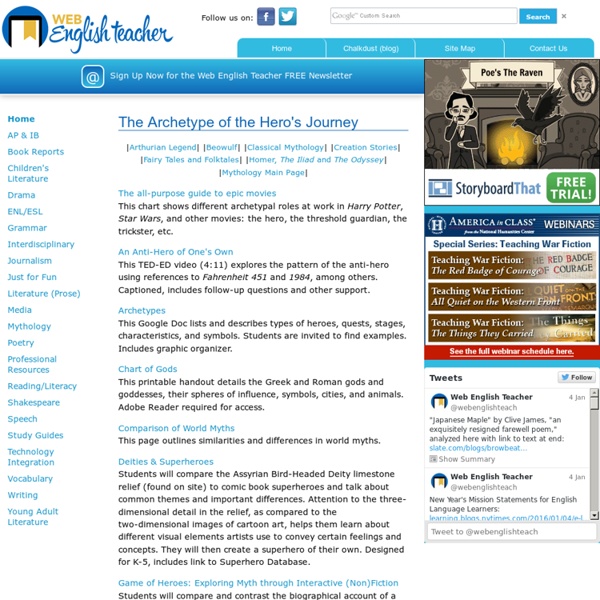The Hero's Quest

MythologyTeacher.com
“A hero is an ordinary individual who finds the strength to persevere and endure in spite of overwhelming obstacles.” Christopher Reeve “A hero is someone who has given his or her life to something bigger than oneself.” Joseph Campbell, an American mythological researcher, wrote a famous book entitled The Hero with a Thousand Faces. George Lucas, the creator of Star Wars, claims that Campbell’s monomyth was the inspiration for his groundbreaking films. The Hero's Journey is a great technique for analyzing all kinds of stories--whether they be myths, legends, films, novels, short stories, plays, or even comic books. All the materials on this page should assist you in teaching heroes and the Hero's Journey.
FilmSound.org: dedicated to the Art of Film Sound Design & Film Sound Theory
Heroes Are Made of This: Studying the Character of Heroes
ReadWriteThink couldn't publish all of this great content without literacy experts to write and review for us. If you've got lessons plans, activities, or other ideas you'd like to contribute, we'd love to hear from you. More Find the latest in professional publications, learn new techniques and strategies, and find out how you can connect with other literacy professionals. More Teacher Resources by Grade Your students can save their work with Student Interactives. More Home › Classroom Resources › Lesson Plans Lesson Plan Overview Featured Resources From Theory to Practice Designed to explore the hero and the heroic in literature, this sequence of activities can be used as a unit or as stand-alone activities. back to top Hero's Traits Reader's Log: Have students use this reproducible to track character traits as they read. Further Reading Moon, Brian. 2000. This lesson is based in part on: Rodrigues, Raymond J., and Dennis Badaczewski. 1978.
Englishbiz - nonfiction & media
© 2014 Steve Campsall Download Free Revision Guide If you are writing about a film or TV programme for coursework - click here If you are writing about a magazine or newspaper ad for coursework - click here While exam questions vary, the skills you need to write a good answer do not. As with all texts you'll be studying, it comes down to your ability to detect what effects the text is creating on its reader and to work out why these effects were created - that is, the writer's purpose. In the exam, typically, you'll be asked to analyse a pair of texts that share a common theme. There are four useful 'levels' at which you can consider texts: What the text is about- its subject matter You need to show you have understood the text's subject matter and content. Who the text has been written for- its audience This is very important: you need to consider audience with care as it will help you recognise features of style that you can discuss in your answers. 1. 2. 3. 4.
Encyclopedia of Myths
teachingmedialiteracy / FilmAnalysis
Film Analysis by Karen Keller and Abbey Weis This chapter deals with all aspects of analyzing film techniques and the historical development of techniques, as well as teaching students to appreciate film quality and fostering responses to films in the classroom. Rationale for Teaching Film Analysis “His lights are out again…he must be showing ANOTHER film…Kids NEVER learn anything in that class because all they ever do is watch movies.” As educators we need to prepare them for this “world” by giving them the tools to critically analyze and deconstruct the rapid flow of information that they commonly experience. Below, we offer multiple teaching ideas on film analysis, links, and other film related activities organized by genre. Cornell University Film Class Part 1. ACTIVITY 1: One idea for an anticipatory set is to have students answer the questions “What makes a good film scene?” ACTIVITY 2: Another anticipatory set is to show the opening sequence and opening credits of Easy Rider (Dir.
Related:
Related:



